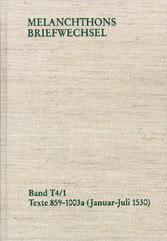Suchen und Finden
Service
Melanchthons Briefwechsel / Band T 4,1-2: Texte 859-1109 (1530)
Ein Höhepunkt der Reformationsgeschichte, der Augsburger Reichstag 1530, ist in Melanchthons Briefwechsel so sehr präsent, dass dieses Thema den gesamten vorliegenden Band füllt: Melanchthon stand als einflussreicher Berater im Zentrum des Geschehens. Dadurch entstanden außer den üblichen Schriftstücken auch Gutachten in Gemeinschaft mit anderen Verfassern, deren verschiedene Stufen in den amtlichen Akten verblieben sind und nun erhebliche paläographische und editorische Probleme aufwerfen. Große Beachtung fand schon immer der Briefwechsel mit Luther auf der Coburg, dessen zahlreiche Abschriften und Drucke erstmals vollständig erfasst und nach den Regeln methodischer Textkritik ediert werden. A high point of the history of the Reformation, the imperial diet in Augsburg in 1530, is so well represented in Melanchthon's correspondence that it fills an entire volume. As the most influential Saxon advisors, Melanchthon stood in the very center of the action. In this way, besides the normal documents, a whole host of opinions written in common with other authors were written, bringing with them a variety of drafts in the official records and posing considerable paleographic and editorial problems. The correspondence with Luther in the Fortress Coburg has always aroused great interest, and its various copies and printings are presented here in complete form for the first time ever, edited according to the rules of modern text criticism. Other themes of this portion of Melanchthon's correspondence include the development of the Augsburg Confession and its Apology, Melanchthon's exploratory conversations with the opposition, the official attempts at reaching agreement in the various committees, and finally (after the imperial diet) the reevaluation of the right of resistance in connection with the formation of the Smalcaldic League.
Alle Preise verstehen sich inklusive der gesetzlichen MwSt.






